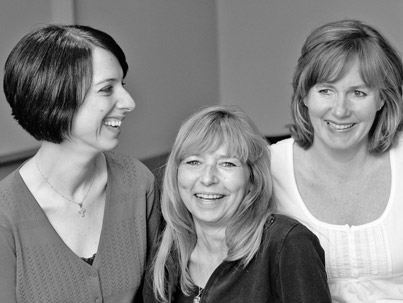Signing up to save a life

With the assistance of Elvie Coletta (left) and Shelley Johnston (right), Diane Miller (centre) performed CPR on a colleague who had a heart attack. The intervention helped save their co-worker’s life.
Owen Egan
CPR savvy staff save colleague's life
A McGill employee who suffered a severe heart attack at work owes her life to her quick-thinking colleagues, especially one who knew how to administer cardiopulmonary resuscitation (CPR) thanks to the First Aid courses she had taken through the university.
On Tuesday, April 22, employees in Financial Services' Research and Restricted Funds sprang to action after a co-worker collapsed. While others called 911, office "First Aider" Diane Miller was summoned. Miller, a Senior Fund Administrator who had taken three previous "First Aid in the Workplace" courses offered through McGill's Office of Environmental Health and Safety, literally took her colleague's life into her own hands. With manager Elvie Coletta relaying instructions from the Urgences Santé operator and Financial Administrator Shelley Johnston assisting her in caring for their stricken colleague, Miller performed CPR, applying chest compressions until the ambulance arrived.
"When I got to her she had no pulse," Miller said. "I just reacted, I didn't stop and think 'OK, what do I do?' It was just automatic."
Miller continued the chest compressions until Urgences Santé technicians took over. Coletta estimates the ambulance arrived approximately seven minutes after the 911 call was made, arriving at the same time as McGill Security officers.
"Time stood still. I don't know how long I did it for. I was on adrenaline, it seemed like forever," Miller said. "I went by instinct, but I also remembered my CPR training, especially about where to apply the compressions, how deep into the chest cavity to go."
The responding Urgences Santé technicians used an Automated External Defibrillator (AED) to resuscitate the employee. Each of the five McGill security vehicles (three downtown and two at the Macdonald Campus) is equipped with an AED, the use of which has become increasingly common these past few years. An AED was recently used to revive a 35-year-old man who suffered a massive heart attack during a floor hockey game at John Abbott College. He is said to be recovering nicely.
A great team
Thanks to the intervention of her colleagues, the McGill employee, who wishes to remain anonymous, is also well along the road to recovery. Despite suffering a second minor attack in the hospital, she was released one week to the day after the life-threatening incident.
"She's doing great, she's at home walking, talking," said Judy Dear, Administrative Assistant at the Office of the Controller, Financial Services. "She sounds very, very sharp."
The Urgences Santé technicians who treated the employee credit those co-workers who took action with saving her life.
"I was in the ambulance with her and the lead technician said 'If she survives, it will be because of what happened in that office,'" said Coletta. "He said what a great team we were. They were so happy."
The days following the incident were emotional ones for the co-workers. Word of their colleague's recovery, received a few days later, was welcome news.
"People needed to talk. We arranged a meeting with a counsellor from the Employee Assistance Program from McGill and everyone around the table spoke. Some of us are still talking about it," said Coletta, who is understandably proud of the way her co-workers handled the situation. "The team pulled together. It's a wonderful team. No one panicked, no one screamed. Everyone just stepped back and gave their colleague privacy and space; the rest of us did what we had to do to try and save a life."
McGill follows Quebec's Commission de la santé et de la sécurité du travail (CSST) regulations requiring a certain percentage of workers per building to be trained in First Aid. The CSST subsidizes the "First Aid in the Workplace" course offered through McGill's Office of Environmental Health and Safety. Those who pass it can become certified "First Aiders" for the area they work in. AED use has been taught in the course since January 2008. Coletta and Johnston signed up for a course immediately after the incident with their colleague, while Miller took a refresher course she was already registered for only two days after saving her co-worker's life.
"In their busy lives people sometimes take First Aid for granted," said Wayne Wood, Associate Director of McGill's Office of Environmental Health and Safety. "They think that someone else around them knows CPR and that's good enough," Wood said. "But whenever an incident of this kind happens, we see a spike in the number of registrations for the courses we offer. In a way, it's a good thing. Because it doesn't matter why you are taking a CPR course, the only thing that matters is that you do," Wood said. "Having this kind of knowledge is powerful stuff. Just like saving a life is."
For more information on McGill's Office of Environmental Health and Safety and the courses offered through it, visit www.mcgill.ca/ehs or call 514-398-4563.

